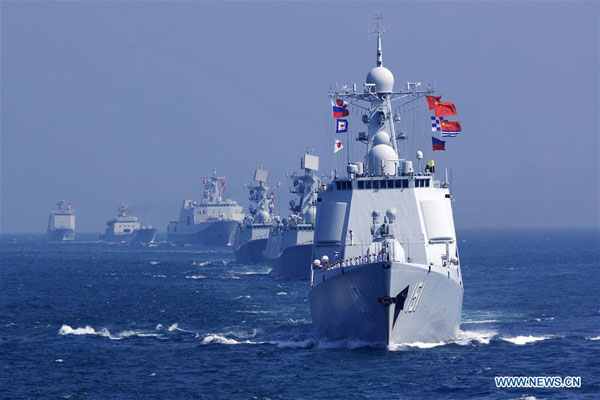


Chinese officers and soldiers waves to say goodbye to Russian fleet during a China-Russia naval joint drill at sea off south China's Guangdong province, Sept 19, 2016. [Photo/Xinhua]
The Chinese military has halted major military dialogue for the near future with the United States in protest of its recent sanctions on Chinese military entities for procuring Russian military hardware, China's Ministry of National Defense said on Saturday night.
On Thursday, the US State Department imposed sanctions on China's Equipment Development Department, the branch of the military responsible for weapons procurement, for engaging in "significant transactions" with Rosoboronexport, a major Russian arms exporter.
The sanctions target the EDD and its director, Li Shangfu, who are involved in China's purchase of Russia's SU-35 combat aircraft and the S-400 surface-to-air missile system, the US department said.
Sanction measures include denying US travel visas to EDD staff and banning them from using the US financial system or making foreign exchange transactions within US jurisdictions. They also block the entity's property and interests within US control, it added.
In response, China summoned US envoys on Saturday, including US Ambassador to China Terry Branstad and the US acting defense attache David Menser, to strongly protest the sanctions.
The MND said in an online statement that China will immediately recall Chinese navy commander Vice Admiral Shen Jinlong, who is in the US attending the 23rd International Seapower Symposium.
In addition, China will postpone the second meeting of a communication mechanism for the joint staff departments of China and the US, scheduled for Sept 25-27 in Beijing, the ministry added.
Military cooperation between China and Russia is a normal activity between sovereign states that goes in line with international law, Huang Xueping, deputy head of the Central Military Commission Office for International Military Cooperation, said in the ministry's statement.
Huang called the US sanctions "unreasonable", a "blatant violation of basic norms of international relations" and "a stark show of hegemony" that severely damage Sino-US military relations as well as bilateral ties.
"China resolutely opposes the US move and will never accept it," he said. "China demands the US side immediately correct its mistake and withdraw the sanctions, and the Chinese military reserves the right to take further countermeasures," Huang warned.
Experts said the sanctions could pose uncertainty on Chinese Defense Minister General Wei Fenghe's planned visit to the Pentagon later this year. The visit was meant to continue the constructive trend of frequent high-level military visits between the two countries, said Cui Tiankai, Chinese ambassador to the US, on July 30.
Earlier this year, the ground force chief of the People's Liberation Army, General Han Weiguo, visited the US, and US Defense Secretary James Mattis, visited Beijing in late June, Cui added.
Experts also called the sanctions a "malicious move" that have not only escalated tensions and damaged the positive momentum of Sino-US military relations, but also left a dangerous impression that the US will confront China and Russia both on trade and military fronts.
Rear Admiral Yang Yi, a professor at the PLA National Defense University, said the US sanctions will have little effect on China's actual military procurement process.
"But it is very damaging to Sino-US military relations because the sanctions are blatant and malicious attempts by the US to sabotage the modernization process of the PLA," he said. "The sanctions also try to make an example out of China and bully other countries to refrain from buying military equipment from Russia."
Russia is the world's second largest weapons seller after the US, and has deals with US allies such as Morocco, Algeria, Egypt, Qatar and Turkey, according to CNN. Kremlin spokesman Dmitry Peskov told reporters on Friday that Russia views the new set of sanctions as an attempt to undermine the competitiveness of Russian arms exports, and vowed to reciprocate.
Fan Jishe, a researcher of US studies at the Chinese Academy of Social Sciences, said the US is "shaming and insulting" China by putting EDD and its director in the crosshairs of the new sanctions over the three-day Mid-Autumn Festival holiday, which ends on Monday.
"It is very disheartening to see the US government taking a confrontational approach to issues that could have been resolved diplomatically," he said.
 Fire brigade in Shanghai holds group wedding
Fire brigade in Shanghai holds group wedding Tourists enjoy ice sculptures in Datan Town, north China
Tourists enjoy ice sculptures in Datan Town, north China Sunset scenery of Dayan Pagoda in Xi'an
Sunset scenery of Dayan Pagoda in Xi'an Tourists have fun at scenic spot in Nanlong Town, NW China
Tourists have fun at scenic spot in Nanlong Town, NW China Harbin attracts tourists by making best use of ice in winter
Harbin attracts tourists by making best use of ice in winter In pics: FIS Alpine Ski Women's World Cup Slalom
In pics: FIS Alpine Ski Women's World Cup Slalom Black-necked cranes rest at reservoir in Lhunzhub County, Lhasa
Black-necked cranes rest at reservoir in Lhunzhub County, Lhasa China's FAST telescope will be available to foreign scientists in April
China's FAST telescope will be available to foreign scientists in April "She power" plays indispensable role in poverty alleviation
"She power" plays indispensable role in poverty alleviation Top 10 world news events of People's Daily in 2020
Top 10 world news events of People's Daily in 2020 Top 10 China news events of People's Daily in 2020
Top 10 China news events of People's Daily in 2020 Top 10 media buzzwords of 2020
Top 10 media buzzwords of 2020 Year-ender:10 major tourism stories of 2020
Year-ender:10 major tourism stories of 2020 No interference in Venezuelan issues
No interference in Venezuelan issues
 Biz prepares for trade spat
Biz prepares for trade spat
 Broadcasting Continent
Broadcasting Continent Australia wins Chinese CEOs as US loses
Australia wins Chinese CEOs as US loses